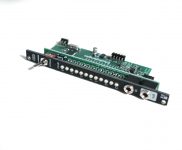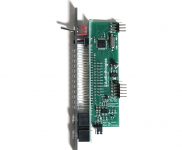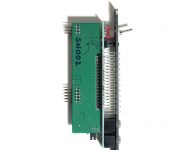Oscillator tuner | Sub octave generator
The Audiothingies CED is a 2HP Eurorack-compatible oscillator tuner with additional square wave sub octave generator.
Tuner
At its heart, a very accurate frequency counter can measure the pitch of the incoming signal and calculates the offset vs the nearest perfect tuned note.
2 display modes are available:
- Strobe mode: a LED is moving, the more out of tune, the faster and vice versa.
A brighter blinking LED indicates the detected note.
When you’re +-10 cents from the ideal pitch, it starts blinking faster.
When you’re +-5 cents from it, it blinks even faster. - Calibration mode: A row of LEDs indicate how far you’re from the ideal pitch.
No LED = 0.5 cent – 1 LED = 1 cent – 2 LEDs = 3 cents – 3 LEDs = 5 cents – From there each LED adds 5 cents
A brighter blinking LED indicates the detected note.
Here’s a video showing both modes at the same time. On the left, strobe mode, on the right, calibration mode.
Sub octave generator
In addition to the tuner, CED can also be used as a square wave sub octave generator.
It can deliver a 10V PP square wave signal 1 or 2 octaves below the input signal. The octave is controlled by the octave switch located on top of the module.
The sub sound is quite classic, but things can get interesting when fed with complex waveforms, like in this example:
Customizable
Don’t need a sub output? Fancy a thru output to save on multiples? CED has 2 internal jumpers allowing you to turn the module into a tuner only module with passive thru output.
In this case, the octave switch function is re-allocated to a bypass function for the tuner, so we made the front panel reversible to show the new behavior. 2 modules in 1 – nice, isn’t it?
Controls
The input jack is where you connect your input signal.
The controls are not the same depending on the jumper settings
Sub output (factory setting)
The mode button will switch between strobe and calibration mode.
A 2s press on this button will bypass the tuner (can be useful when playing, as the LEDs moving can be distracting).
The octave switch switches the sub output from -1 to -2 octaves.
The sub jack is where you’ll get your square sub waveform.
Thru output
The mode button will switch between strobe and calibration mode.
The switch bypasses the tuner.
The thru jack should be self explanatory.
User settings
These settings can be changed according to your needs
- The base frequency can be tuned from 432Hz to 445Hz. Some think it sounds better @ 432Hz, try it and make your own opinion 🙂
- 4 different LED brightness modes (low/mid/hi/max contrast between blink note and note accuracy)
To access these settings, press mode while powering your modular system.
All LEDs will flash 2 times, release mode. You are in user settings mode.
Set the octave switch in UP position to set the base frequency.
Press the mode button to change the base frequency:
- No LEDs means A440
- For each LED turned on starting from the bottom of the row: add 1 cent to 440 (5 LEDs on max = 445Hz)
- For each LED turned on starting from the top of the row: remove 1 cent from 440 (8 LEDs on max = 432Hz)
Set the octave switch to DOWN position to set the LEDs brightness.
Press the mode button to change the LEDs brightness: the LEDs will reflect the actual changes.
To save your settings and return to normal operation, hold the mode button for 2s.
Technical stuff
Format: Eurorack
Width: 2HP
Panel material: Black matte fiberglass
Depth: 50mm (including power cable without cable clamp)
Power requirements: +12V: 30mA | -12V: 7mA | +5V: 0mA (does not need any 5V in the case)
Tuner working range: 5Hz to way more than 20kHz (12 octaves minimum)
Displayed precision: +- 0.5 cents
Warning: CED is based internally on a frequency counter, as such, it is not capable of calculating the pitch of complex waveforms or mix of raw waveforms
However, it’s not a “dumb” frequency counter, it’s been tailored to offer the same great accuracy over the whole audio range.





